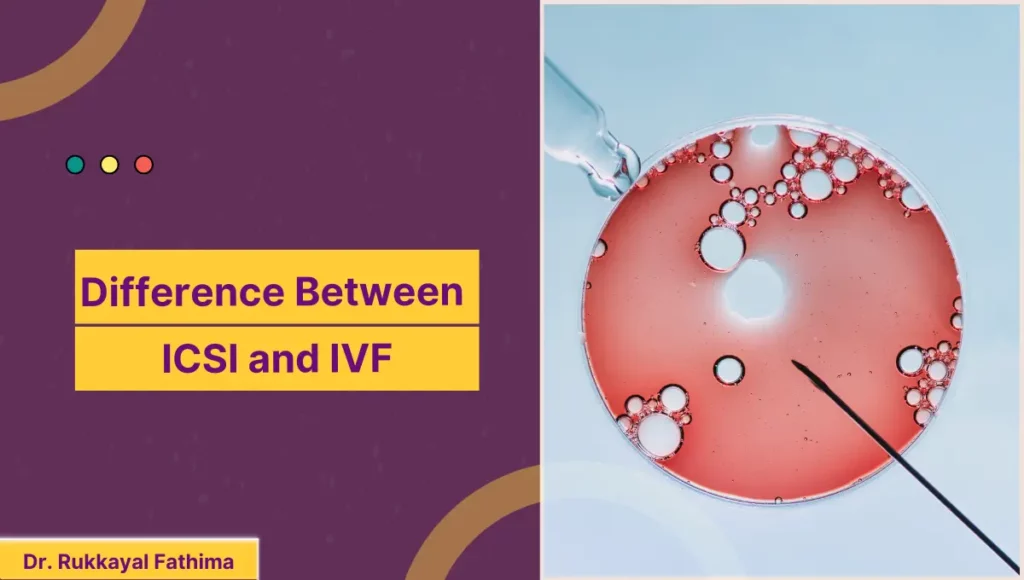With the recent increase in fertility issues around the world, Assisted Reproductive Techniques (ARTs) have become a popular method for fertility treatments. IVF (In Vitro Fertilisation) and ICSI (Intracytoplasmic Sperm Injection) are two of the most common methods of ART.
Even though both IVF and ICSI fertilisation occur outside the woman’s body, the procedure is different for them. This article gives a clear picture of the differences between ICSI and IVF treatments.
Difference between ICSI and IVF treatments
The procedure and requirements for IVF and ICSI fertilisation are different. Here are some of the differences between IVF and ICSI treatments.
| IVF | ICSI |
|---|---|
| A great number of high-quality sperm are required to successfully conduct fertilisation. | A limited number of high-quality sperm are sufficient to cionduct fertilisation. |
| Several sperm are placed with the eggs on a petri dish for fertilisation. | A single, healthy sperm is injected into the cytoplasm of the egg. |
| Sperm penetrate the eggs on their own. | Sperm are aided by a thin needle (micropipette) to penetrate the eggs. |
| Can be used in cases of both male and female infertility | Mostly used in cases of male infertility. |
| Preferred if other infertility | Preferred if the traditional IVF |
| treatments like artificial insemination (IUI) fails. | fertilisation method fails. |
When is ICSI used?
ICSI is mostly used in cases of male infertility, where the sperm are having issues penetrating the outer layer (zona pellucida) of the egg on their own. This occurs when the quality of the sperm is not up to par with the traditional way of IVF fertilisation.
- The quality of the sperm can be affected by various factors. Some of them are given below.
- The semen has a low sow sperm count,
- The sperm has poor motility.
- Sperm has morphological or chromosomal abnormalities.
- There are high levels of antibodies in the sperm.
- The sperm was previously frozen.
- Previous IVF treatments using traditional IVF fertilisation have failed.
What ICSI offers
Where IVF doesn’t help, ICSI can offer men with fertility problems a chance to have their own child with their partners.
Men with no sperm (azoospermia), low sperm count (oligospermia), or those whose sperm cannot fertilise the eggs on their own can benefit from this method.
When Do Embryologists Utilize IVF/ICSI?
Your embryologist is the person that travels with you throughout the IVF or ICSI process. Embryologists usually recommend IVF/ICSI when either or both partners have fertility problems.
Here are some circumstances that show that an individual or couple is infertile.
- An individual or couple under 35 years of age can’t conceive a child naturally after regular, unprotected intercourse for a year.
- An individual or couple over 35 years of age can’t conceive after six months of regular, unprotected intercourse.
- Women with medical issues that can restrict them from getting pregnant, like endometriosis, damage or blockage in the fallopian tubes, PCOS, etc.
- Men with medical issues like azoospermia (low to no sperm count), problems with sperm count, motility, shape, etc.
Which is better, IVF or ICSI?
If there is no complications in IVF treatments and the sperm are fully capable of fertilising the eggs on their own, couples can go for IVF treatments. Sometimes, ICSI treatments can damage the eggs when the needle pierces them.
So, unless there is a chance of the sperm fertilising the eggs on their own, embryologists will choose the IVF method. Additionally it is important to know the difference between IVF and IUI.
When the IVF procedure doesn’t work, embryologists choose the ICSI method of fertilisation to aid the sperm in fertilising the eggs. This procedure also makes sure that the eggs are fertilised.
Conclusion
Both IVF and ICSI are popular fertility treatments that many couples choose to achieve fertilisation and have a baby of their own. The main difference between them is the fertilisation process.
While in IVF, the sperm can fertilise the eggs on their own, ICSI treatment collects and injects a single sperm into the egg. Both are effective fertility treatments that can help a couple attain parenthood.
Whatever method one chooses, they should first consult an experienced fertility doctor for guidance and follow them without fail.
Frequently asked questions
There are many factors that can cause infertility in women. Some of the most common factors are
- Damaged or blocked fallopian tubes,
- Endometriosis (a condition where the tissues lining the inside of the uterus grow outside of it), and
- PCOS (Polycystic Ovary Syndrome).
Once the embryos treach the blastocyst stage, they can be transferred back into the mother’s uterus for further development. This procedure is called embryo transfer. There are two types of embryo transfer
- Fresh embryo transfer, where the embryos are transferred back into the uterus within five to six days of egg retrieval.
- Frozen embryo transfer, where the embryos are frozen for future use.
IVF is one of the most popular assisted reproductive techniques. Even so, there are some complications that may arise if the procedure is not done right. Here are some of them.
- Complications with egg retrieval.
- Multiple births.
- Chances of mscarriage.
- Premature delivery.
- Ectopic pregnancy.
- OHSS (Ovarian Hyperstimulation Syndrome).
IUI (Intrauterine Insemination) is als a method of assisted reproductive technology. It is a type of artificial insemination where the male sperm are collected and injected directly into the uterus for fertilisation. This method is usually used in couples who don’t have major fertility issues.
IVF is done under the xpert care and supervision of fertility doctors. It is not a painful process. But, women might experience some mild discomfort after egg retrieval and embryo transfer procedures.
They may experience side effects like nausea and vomitting, headaches, abdominal pain, bloating, bruising, low blood pressure, etc. these effects are mostly minor and pass after a short period.





